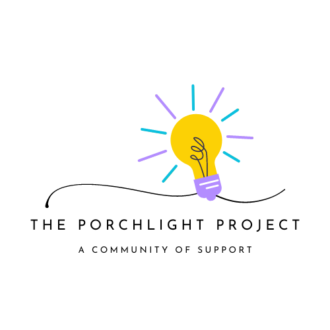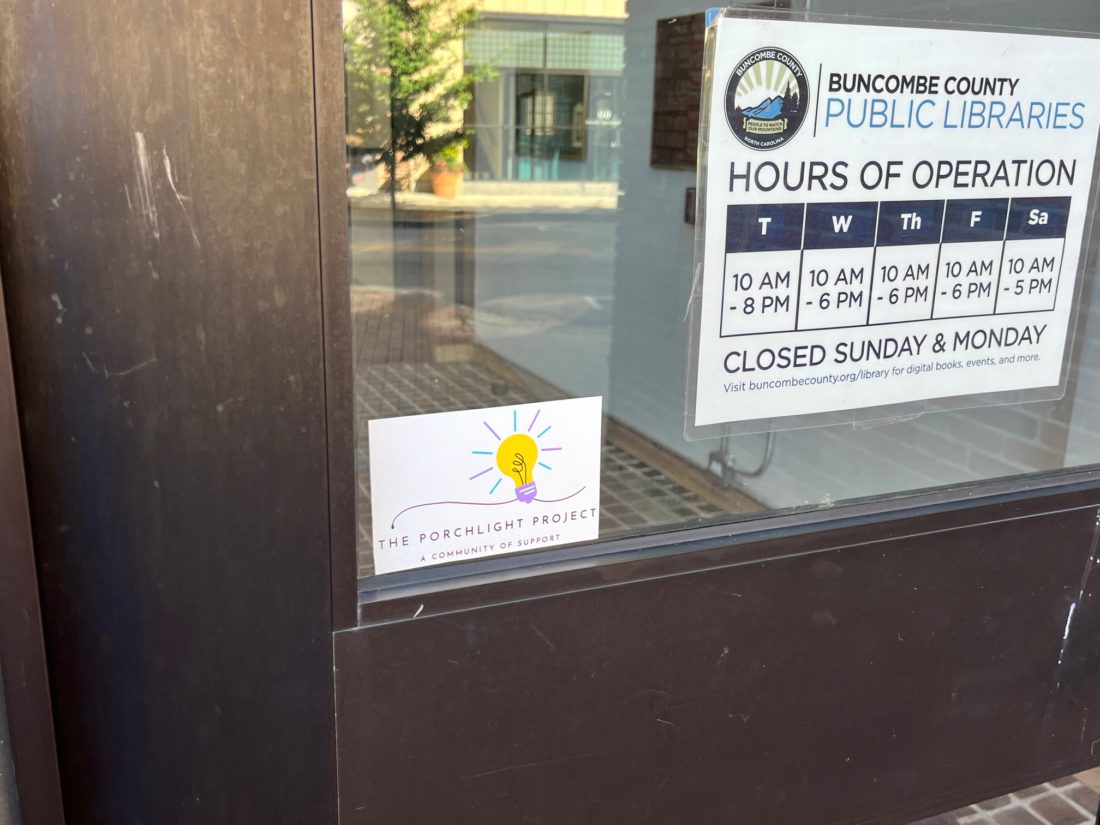Those who have never been in an abusive relationship might not understand how the power dynamic severely limits a survivor’s day-to-day life.
Caitrin Doyle, outreach coordinator for Helpmate, a nonprofit that advocates for survivors of domestic violence, describes a hypothetical scenario of how an abuser exerts control.
“I might get permission to go to the grocery store, because that’s the dynamic of abuse in my relationship,” Doyle explains. “I might be told that I can spend $25. I drive to the grocery store … and my partner is going to review my location. He’s going to watch what I did, where I went, how I went there. He’s going to see how much money I spent, and he’s going to compare the time that I was gone to the time that he thinks it should have taken me to do that.”
Living under such control — with no access to money, and with phone and internet constantly monitored — restricts a survivor’s access to help. But a new collaboration in Buncombe County offers a unique solution. The Porchlight Project creates access to support in the path of survivors’ daily lives: through a network of libraries, shops, hotels and breweries.
Participating partners post a Porchlight Project logo on their doors; if a person asks to make a phone call to The Porchlight Project, these businesses are trained to take the individual to a private space, provide them with a phone to use and allow them privacy to make the call. “The reason that we ask businesses to be involved is because [going to these places] is sometimes the only opportunity that people have to speak at all about what’s happening at home,” says Doyle.

“Both sexual violence and domestic violence thrive in isolation,” explains Our VOICE Executive Director Rita Sneider-Cotter. “The more folks we have that are knowledgeable in the community and are wanting to take a stand to help survivors, the less isolated survivors feel.”
Violence in Buncombe County
The Porchlight Project is a collaboration between Helpmate, the sexual violence survivors advocacy nonprofit Our VOICE and the Buncombe County Family Justice Center.
Our VOICE program director Jenn Hegna says conversations about establishing a program like The Porchlight Project started in March 2023. She credits Helpmate’s lethality assessment protocol coordinator, Kevin Long, as being integral to developing the initiative. But most crucial, she says, was receiving input from survivors of domestic violence and sexual violence on what they thought the initiative should do.
According to a June 18 presentation by the Buncombe County Domestic Violence Fatality Review Team to the Buncombe County Board of Commissioners, abusers killed three individuals in known intimate partner violence in Buncombe County during 2023. The review found high lethality indicators — meaning warnings that the abuser would kill the survivor — including access to a gun, controlling behavior and spying.
It also found abusers had “nearly uninterrupted access to firearms despite multiple intimate partner complaints.”
The presentation also shared that during fiscal year 2023, Helpmate administered 1,175 danger assessments, and 638 of those “indicated the highest level of extreme danger for a survivor.”
‘Folks coming in dealing with crises’
Buncombe County Public Libraries participated in a trial run of The Porchlight Project in February, says Buncombe County Library Director Jason Hyatt. “We already know that libraries attract a great cross-section of people at any given time,” Hyatt explains. “There are folks coming in that are dealing with crises. … It made sense to participate.”
He says Family Justice Center employees came to each of its 13 branches to train library staff; they consulted on the ideal spaces within each library that would allow for making private phone calls.
On July 1, The Porchlight Project launched countywide with dozens of participating locations, including Asheville YMCA and Woodfin YMCA; the Goodwill Career Center; shops like Gamers’ Haunt, Comic Envy and Maurices; breweries like Highland Brewing Co. and the River Arts District Brewing Co.; and all five hotels within Asheville Hotel Group. (A map of locations is at avl.mx/dw2.)
There is no cost for businesses to participate in the program. Management attends a two-hour training at the Family Justice Center about the basics of sexual violence and intimate partner violence, available resources from Our VOICE and Helpmate, and the asks of the initiative. If managers decide to participate, they sign a memorandum of understanding, Hegna says. Management then trains the staff on The Porchlight Project procedure. New businesses can be trained to participate in The Porchlight Project on a rolling basis. Hegna says large businesses can receive one-on-one training.
Car dealerships are one type of business that Doyle would like to see join The Porchlight Project; she surmises that car dealerships would perhaps see indications of financial abuse. The Porchlight Project is also hoping to bring aboard “service-oriented businesses — nails, hair, therapy practices, restaurants, bars,” she says. She calls them “places where you might have a professional relationship with the people who work there … because you’re going to be more likely to engage with help if you are comfortable.”
What happens
When an individual asks to make a Porchlight Project call, the person can elect to call Buncombe County Emergency Services via 911, the Our VOICE hotline or the Helpmate hotline. (Our VOICE works with survivors age 13 and up, explains Hegna. Survivors of child sexual assault or child sexual violence will be referred to Mountain Child Advocacy Center, a social services organization for youth.)
Both Our VOICE and Helpmate have an individual hotline that is answered 24/7, 365 days a year. Staff members explain each nonprofit’s confidentiality policy. Helpmate also discusses North Carolina’s mandatory reporting laws on the initial call. According to N.C. State Statute, “Any person or institution who has cause to suspect that any juvenile is abused, neglected, or dependent … shall report the case of that juvenile to the director of the department of social services in the county where the juvenile resides or is found.”
Doyle explains that Helpmate discusses its legal responsibilities for mandatory reporting “right at the top, so that people can make informed choices about what they want to share or what they don’t want to share.”
Doyle says Helpmate’s hotline asks the caller if he or she has any immediate needs such as food or a place to stay. If the caller needs shelter and Helpmate has space in its own shelter, the agency conducts a screening over the phone to assess eligibility for shelter. But if Helpmate doesn’t have space in its own shelter, staff lets the caller know that upfront, then explores the possibility of other shelters in Buncombe County and other shelters serving domestic violence survivors in neighboring counties. Another option Helpmate can assist with is connecting the caller to friends or family.

Once these plans are made, Helpmate can start coordinating transportation for the caller, Doyle explains.
Why it’s needed
While The Porchlight Project is, practically speaking, a procedure to connect survivors with support, it also demonstrates to survivors of abuse that a caring community exists.
A dynamic of abuse is that “oftentimes their abuser tells them this is happening because of something they did,” Hegna explains. Establishing a community of support for survivors is “validation that they don’t deserve this.”
Michael Horvath, executive administrative assistant for Asheville Hotel Group, says 40 managerial-level employees received Porchlight Project training and took what they learned back to each hotel to train staff. He emphasizes that the goal of participating in The Porchlight Project is to get staff comfortable with speaking up if they see something potentially amiss.
For example, one concern in the hotel industry is sex trafficking, Horvath says. Asheville Hotel Group staff are now trained to recognize possible indicators of trafficking behavior, such as “if the adult does not want a young person talking to anybody else,” he explains.
“We’re not looking for our staff to be saviors of the universe,” Horvath continues. “We want them to be aware … [and] get a manager involved right away.”
Increasing awareness among the Asheville Hotel Group’s staff about domestic violence and sexual violence is a worthy goal in itself, Horvath says, acknowledging that some employees may be experiencing it at home. “It’s devastating that this has to be done in the first place. It’s horrifying that this kind of stuff happens, so that alone is tear-jerking, to be honest.”
He notes that the Asheville Hotel Group’s chief operating officer, Brenda Durden, is an Asheville native. “The way we look at it is we live here and we’re all about the community,” he says. “We couldn’t be happier to be a part of this project.”
The next training for participation in The Porchlight Project is Monday, Aug. 5, 10 a.m., at the Family Justice Center, 35 Woodfin St. Businesses can sign up at porchlightprojectnc.org.




Before you comment
The comments section is here to provide a platform for civil dialogue on the issues we face together as a local community. Xpress is committed to offering this platform for all voices, but when the tone of the discussion gets nasty or strays off topic, we believe many people choose not to participate. Xpress editors are determined to moderate comments to ensure a constructive interchange is maintained. All comments judged not to be in keeping with the spirit of civil discourse will be removed and repeat violators will be banned. See here for our terms of service. Thank you for being part of this effort to promote respectful discussion.